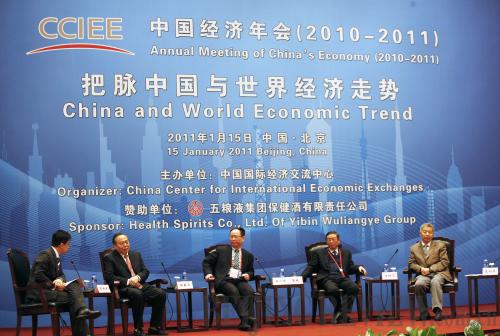|
 |
|
EXCHANGING IDEAS: Experts and business figures exchange their opinions at the Annual Meeting of China's Economy (2010-11), hosted by the China Center for International Economic Exchanges, a non-government think tank, in Beijing on January 15, 2011 (ZHENG YUE) |
On top of this, government-affiliated think tanks are also getting more credit for their work.
For example, since its founding in 1981, the Development Research Center (DRC) of the State Council has participated in the drafting of medium- and long-term socioeconomic development plans, as well as the research and decision-making process of every major policy of reform and opening up. It also organizes or takes part in important national research projects, and researches on regional development strategies and planning. The center has become the most influential government think tank on economic policies, while the Chinese Academy of Governance, which was founded in the 1990s, is now the best known government-affiliated think tank on political affairs in China.
The largest part of services provided by the DRC of the State Council is its research projects, which involve the largest amount of polling and basic research. The conclusion is written into a report or a summary, which is submitted to central authorities.
The CPC Central Committee also has two affiliated think tanks—the Policy Research Office and the Party School.
Besides conducting research projects and writing papers delivered to top leaders, research fellows of these think tanks have been invited to give lectures at learning sessions of the members of Political Bureau of the CPC Central Committee.
China's top decision-makers have also showed an unprecedented gesture in valuing the opinions from privately funded think tanks. In October 2003, the National Development and Reform Commission, China's top economic planner, invited bids from around the world for preparatory research programs for the drafting of the country's 11th Five-Year Plan (2006-10), the first time bids had been solicited in this way. Several non-governmental think tanks were later selected through the bidding process and participated in drafting the plan.
Some non-governmental think tanks have become so influential that government departments seek their opinions during the policymaking process.
One example is the China Center for International Economic Exchanges, which was founded in 2009 by 122 members from economic, academic, diplomatic fields as well as former government officials. As a high-profile think tank from its inception, it drafted a proposal on establishing a mechanism for promoting transformation of China's development mode before the Third Plenary Session of the 18th CPC Central Committee, with the center's Chairman and former Vice Premier Zeng Peiyan as the project leader, and sent the proposal directly to top state leaders.
However, a large number of non-governmental think tanks faced the difficulty in development caused by the lack of government's trust in their work, insufficient financial resources and weak self-development capacity. Many experts believe, as these think tanks operate outside of the interests of specific sectors, the government should provide more support for their establishment and development, which could include methods such as granting tax breaks, nurturing demands for their research products and boosting the growth of the consultancy market. The government should also help non-governmental think tanks to grow and promote healthy competition in the market so that those doing solid research can be the winners.
"It is common for different think tanks to draw different conclusions on the same issue and these results can all be meaningful to decision-makers as long as they are based on accurate data and rigorous methodology," said an anonymous expert.
Seeking input from abroad
As Shanghai's earliest shopping street, the Nanjing Road was once known as "the busiest shopping street in China." However, its status declined in the 1990s when a large number of modern shopping facilities were built in other parts of the city. When compiling a development plan to renovate the historic road, the local government turned to McKinsey & Company, an American global management consulting firm, for the design.
This project marked the beginning of the cooperation between the Shanghai Municipal Government and McKinsey, which has lasted for more than a decade. When meeting with Dominic Barton, Managing Director of McKinsey, during his visit to Shanghai earlier this year, Shanghai Party chief Han Zheng said that the primary task for CPC Shanghai Municipal Committee and Shanghai Municipal Government is to comprehensively promote reforms and that these reforms require wisdom from across the globe.
Back in 2004, McKinsey designed a plan to reform China's medical care system for the Ministry of Health, currently known as the National Health and Family Planning Commission, which stood out from the other seven reform plans that year as the only one with foreign input. McKinsey has also helped the Chinese Ministry of Commerce draft a white paper on the development of China's outsourcing industry and advised the ministry on predicting development trends of e-commerce and logistics.
| 